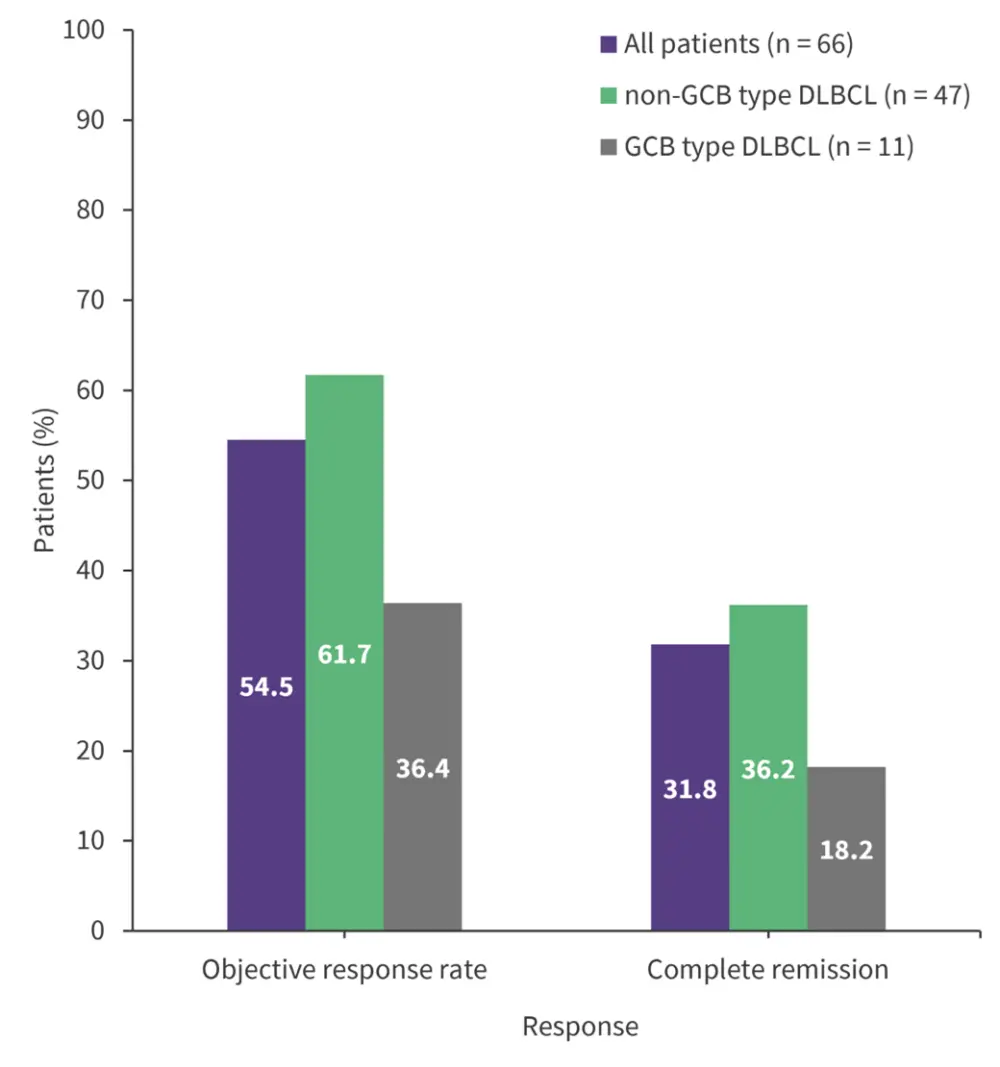All content on this site is intended for healthcare professionals only. By acknowledging this message and accessing the information on this website you are confirming that you are a Healthcare Professional. If you are a patient or carer, please visit the Lymphoma Coalition.
The lym Hub website uses a third-party service provided by Google that dynamically translates web content. Translations are machine generated, so may not be an exact or complete translation, and the lym Hub cannot guarantee the accuracy of translated content. The lym and its employees will not be liable for any direct, indirect, or consequential damages (even if foreseeable) resulting from use of the Google Translate feature. For further support with Google Translate, visit Google Translate Help.
The Lymphoma & CLL Hub is an independent medical education platform, sponsored by AbbVie, BeOne Medicines, Johnson & Johnson, Miltenyi Biomedicine, Nurix Therapeutics, Roche, Sobi, and Thermo Fisher Scientific and supported through educational grants from Bristol Myers Squibb, Lilly, and Pfizer. Funders are allowed no direct influence on our content. The levels of sponsorship listed are reflective of the amount of funding given. View funders.
Now you can support HCPs in making informed decisions for their patients
Your contribution helps us continuously deliver expertly curated content to HCPs worldwide. You will also have the opportunity to make a content suggestion for consideration and receive updates on the impact contributions are making to our content.
Find out more
Create an account and access these new features:
Bookmark content to read later
Select your specific areas of interest
View lymphoma & CLL content recommended for you
Acalabrutinib with lenalidomide and rituximab for R/R aggressive B-cell non-Hodgkin lymphoma
Rituximab plus chemoimmunotherapy has improved outcomes for patients with CD20+ aggressive B-cell non-Hodgkin lymphoma (NHL), including diffuse large B-cell lymphoma (DLBCL); however, a significant portion of patients relapse. While chimeric antigen receptor T-cell therapy has demonstrated efficacy in patients with relapsed/refractory (R/R) DLBCL, alternative strategies are being explored due to the potential financial burden of this treatment.1 The combination of Bruton's tyrosine kinase inhibitors with lenalidomide and rituximab could be an effective regimen for patients with R/R aggressive B-cell NHL.1
Park et al.1 recently published results from a phase II trial (NCT04094142) assessing the safety and efficacy of acalabrutinib, a Bruton's tyrosine kinase inhibitor, in combination with lenalidomide and rituximab (R2A regimen) in patients with R/R B-cell NHL in Nature Communications. Below, we summarize the key findings.
Study design and patient population1
- This was an open-label, single-arm phase II trial.
- Patients received 375 mg/m2 rituximab intravenously on Day 1, 20 mg lenalidomide orally once daily on Days 1–21, and 100 mg acalabrutinib orally twice daily on Days 1–28, repeated every 4 weeks for up to 6 cycles.
- Patients with a response could receive acalabrutinib monotherapy as maintenance therapy for up to one year.
- The primary endpoint was the objective response rate (ORR).
Key findings1
Patient characteristics
- In total, 66 patients received treatment, most of whom had DLBCL (Table 1).
- The median age was 67.5 years (range, 20–87).
Table 1. Pathological diagnosis of patients treated with R2A regimen*
|
Pathological diagnosis, % |
Patients (n = 66) |
|
DLBCL, diffuse large B-cell lymphoma; FL, follicular lymphoma; GCB, germinal center B-cell type; non-GCB, non-germinal center B-cell type; NOS, not otherwise specified; PCNSL, primary central nervous system lymphoma; PMBCL, primary mediastinal B-cell lymphoma; R2A, acalabrutinib with lenalidomide and rituximab. |
|
|
DLBCL, non-GCB |
71.2 |
|
DLBCL, GCB |
16.7 |
|
DLBCL, NOS |
4.5 |
|
PCNSL |
3.0 |
|
PMBCL |
3.0 |
|
FL |
1.5 |
Efficacy
- The ORR and complete remission rate were 54.5% and 31.8%, respectively (Figure 1).
- The ORR and complete remission rate were not significantly different between patients with non-germinal center B-cell type DLBCL and germinal center B-cell type DLBCL (p = 0.179 and p = 0.310, respectively; Figure 1).
- The median duration of response was 12.9 months and median progression-free survival was 4.4 months.
- The 1-year progression-free survival and overall survival rates were 33.1% and 67.5%, respectively.
- In total, seven patients had MYD88 mutations, and the median progression-free survival among these patients was 4.5 months.
Figure 1. Objective response rate and complete remission rate in patients receiving the R2A regimen*

DLBCL, diffuse large B-cell lymphoma; GCB, germinal center B-cell; NOS, not otherwise specified; R2A, acalabrutinib with lenalidomide and rituximab.
*Data from Park et al.1
Safety
- In total, 39 patients experienced adverse events, most commonly neutropenia (n = 21), skin rash (n = 17), thrombocytopenia (n = 6), and pruritus (n = 6).
| Key learnings |
|
References
Please indicate your level of agreement with the following statements:
The content was clear and easy to understand
The content addressed the learning objectives
The content was relevant to my practice
I will change my clinical practice as a result of this content



